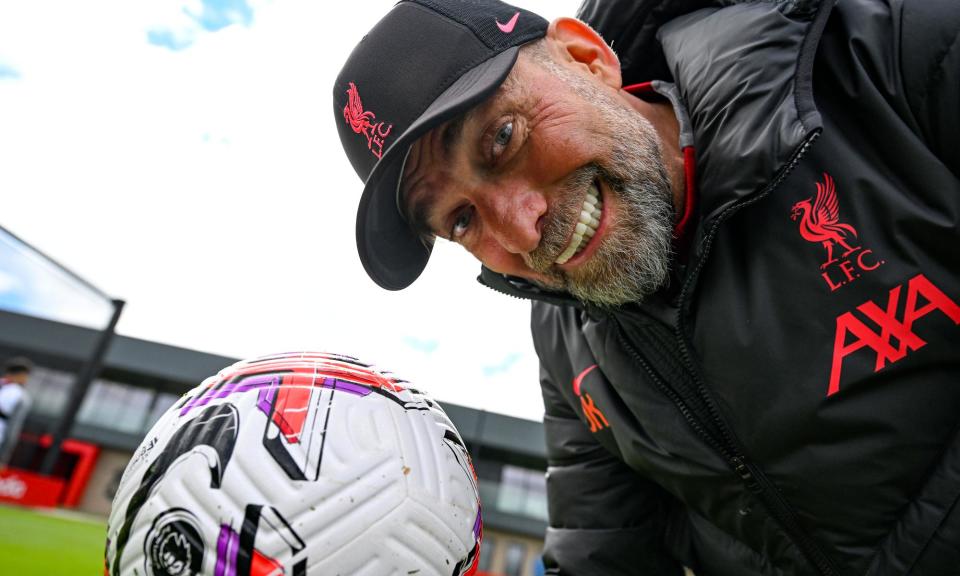Jürgen Klopp, like Bill Shankly, will leave his Liverpool successor a strong hand

The similarities between the unexpected departures from Liverpool of Jürgen Klopp and Bill Shankly are unavoidable. Shankly also spoke of weariness, although he perhaps felt, after a brilliant performance in the FA Cup final a couple of months earlier, that there were no more worlds to conquer. But in both cases there was no buildup, no warning, a team playing well, quite possibly on the ascent to yet greater heights. With both managers, the prevailing sense at the announcement was shock, the sense of more to give.
But perhaps the hardest thing is to know when it’s over. The temptation must always be for one last try. If things are going well, why not try to burnish the record just a little more? And if they are not, then what trope is more beloved of sport than that of the return from the wilderness? How better to redeem the years of frustration than by joining Muhammad Ali, Jack Nicklaus and Mark Cavendish is one final act of defiance against time, the critics and the fates?
Related: Alonso, like Klopp, gets Liverpool – is it the right time for an Anfield return?
The tendency for those recognised as greats, particularly when they have longevity at one club, is to hang on. It happened to Brian Clough and it happened to Arsène Wenger. Sir Alex Ferguson was a rarity in being able to keep winning till the end, lifting the championship in his final season at Manchester United, although nobody would claim that the side of 2012-13 was one of his best – and what happened subsequently suggests problems were already being stored up for his successors, promising as the signings of Shinji Kagawa and Wilfried Zaha appeared at the time. Leeds similarly won the league title in Don Revie’s final season before he took the England job but he left a squad that had grown old together and was in desperate need of renewal.
Nothing perhaps is harder for a manager than the process of dismantling a team that have been great and starting to build anew. That Ferguson was so adept at that was testament to his almost pathological ruthlessness. Revie admitted he couldn’t face breaking apart a group that he had regarded almost as a family. Liverpool’s slump last season was partly the result of the accumulated fatigue, physical and emotional, of the previous season when they came so close to the quadruple, partly of injuries, but it was also caused by the difficulty of regeneration.
In as far as these issues are possible to assess – there was a widespread belief in 2013 that Ferguson was leaving his successor, David Moyes, a strong hand – Klopp will hand over a squad that is already largely rejuvenated. There may still be need of a top-level defensive midfielder and work remains on the back four, but the new manager will be able to perm three from five top-level forwards while the majority of the reconstruction of the midfield has been done: Dominik Szoboszlai plus Alexis Mac Allister, plus a holder, with Curtis Jones, Ryan Gravenberch, Harvey Elliott and Stefan Bajcetic as back-up, looks potentially hugely promising.
Clough and Wenger lingered, too great to be removed, or at least not soon enough. Anybody who has had success over a protracted period faces the same problem, that they stop asking what the most appropriate solution to any given problem is and turn instead to the most characteristic solution. And as both started to find silverware harder and harder to come by, both redefined what constituted success.
Related: Jürgen Klopp will leave a void in Liverpool: at the club and the city | Paul MacInnes
For Clough it was sending out teams of young men with neat haircuts who played nice football; it brought moderate success for a while, top six finishes and League Cups, but nothing like the glories of 1978-80. For Wenger it was passing football without “financial doping”; that similarly brought a diluted form of success, not the league titles of 1998-2004, but a string of top-four finishes and FA Cups.
Shankly soon regretted his retirement but for Liverpool his decision to leave with the club on the up facilitated a (relatively) smooth transition to the Bob Paisley era of six league titles and three European Cups. For Klopp, there will be a Carabao Cup final at the very least, but they beat Arsenal away in the FA Cup, are the favourites to lift the Europa League and, most important, their title challenge feels as plausible as it ever has. There has been no lapse into self-parody.
Among all the many things he has achieved at Liverpool, it may be that leaving now stands among the greatest. That will to an extent be determined by how the younger players he leaves develop, and by the achievements of his successor – although the huge difference from Shankly is that there is no obvious Paisley figure waiting to step in. Klopp’s stint at Anfield may end in glory or it may not, it may presage further glory or it may not, but it will at least not end in drift or apathy.

